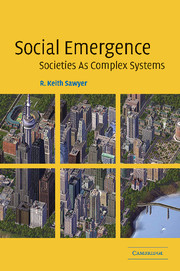Book contents
- Frontmatter
- Contents
- List of figures and tables
- Acknowledgments
- 1 Emergence, complexity, and social science
- 2 The third wave of social systems theory
- 3 The history of emergence
- 4 Emergence in psychology
- 5 Emergence in sociology
- 6 Durkheim's theory of social emergence
- 7 Emergence and elisionism
- 8 Simulating social emergence with artificial societies
- 9 Communication and improvisation
- 10 The Emergence Paradigm
- References
- Index
10 - The Emergence Paradigm
Published online by Cambridge University Press: 10 May 2010
- Frontmatter
- Contents
- List of figures and tables
- Acknowledgments
- 1 Emergence, complexity, and social science
- 2 The third wave of social systems theory
- 3 The history of emergence
- 4 Emergence in psychology
- 5 Emergence in sociology
- 6 Durkheim's theory of social emergence
- 7 Emergence and elisionism
- 8 Simulating social emergence with artificial societies
- 9 Communication and improvisation
- 10 The Emergence Paradigm
- References
- Index
Summary
The problems which [the social sciences] try to answer arise only in so far as the conscious action of many men produce undesigned results, in so far as regularities are observed which are not the result of anybody's design. If social phenomena showed no order except in so far as they were consciously designed, there would indeed be no room for theoretical sciences of society and there would be, as is often argued, only problems of psychology.
F. A. von HayekSocial emergence is the central phenomenon of the social sciences. The science of social emergence is the basic science underlying all of the social sciences, because social emergence is foundational to all of them. Political science, economics, education, history, and sociology study phenomena that socially emerge from complex systems of individuals in interaction. In this concluding chapter, I argue that sociology should become the basic science of social emergence, and I outline a theoretical framework to guide this study. This new sociology would be as Comte and Durkheim originally envisioned: By concerning itself with the foundational processes of social emergence, sociology would be at the core of the social sciences.
But this is not the sociology we see today; few sociologists study social emergence. In the second half of the twentieth century, economics has made the best case for being the foundational social science, by making social emergence central to its theory and practice.
- Type
- Chapter
- Information
- Social EmergenceSocieties As Complex Systems, pp. 189 - 230Publisher: Cambridge University PressPrint publication year: 2005

